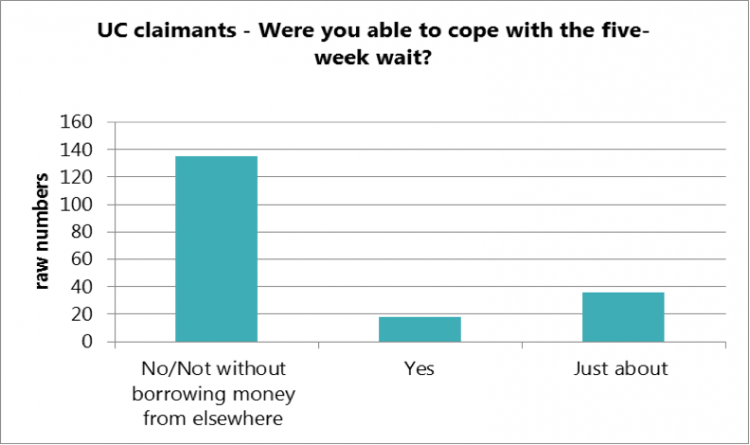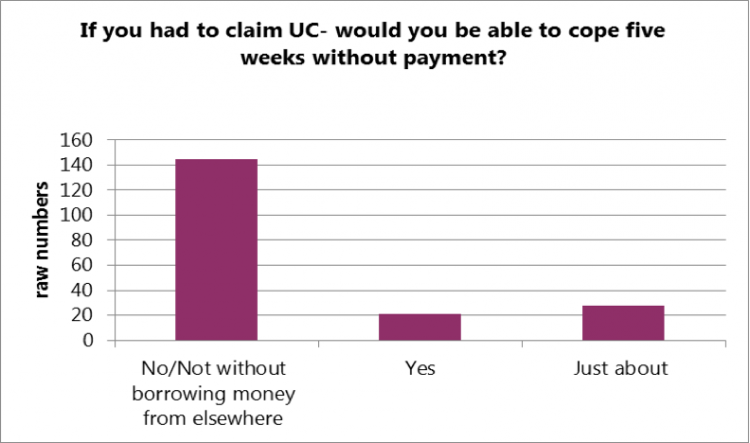The five-week wait for first payment of universal credit is unnecessary and unacceptable
The coronavirus pandemic is hitting the UK economy hard. The newly unemployed will find it difficult to find work - and so the social security system is key to supporting them and their families.
Unfortunately, universal credit - the government’s flagship benefits system fails do this because of its design. And the inadequate levels of social security in the UK compound the problem.
The five-week wait has fundamental consequences.
Claimants are falling into poverty and debt, and rising numbers are being referred to foodbanks.
Advance loans are available, but these must be paid back out of future meagre benefit payments. And this essentially means you are starting your universal credit claim in debt.
Claimants who have been reluctant to claim the advance cite the fear of falling into debt.
On top of the advance payment, claimants are often paying other deductions, for example council tax arrears, utility payments and tax credit overpayments.
More than 1.6 million families on universal credit in May had an average sum of £60 deducted from their benefits. £100 million was deducted from these families, with the majority (86 percent) of this paying back the advance payment.
This was during the height of the lockdown and when working people were experiencing huge financial insecurity.
The number of people on universal credit as of 8th of October is 5.7 million. There has been a 90 percent (2.7 million) increase in numbers from 3 million on 12 March 2020.
The National Audit office, estimate that 57 percent of households making a new claim received a repayable universal credit advance in the six months to February 2020.
Data on advances are not published in official statistics, however experimental data on advances during the initial period of the coronavirus pandemic was published.
Between the start of lockdown and 23rd June over a million advance payment loans were made to new claimants.
There is no operational need for the wait
The government argue that an assessment cycle with a monthly payment in arrears ‘mirrors the world of work’.
But not everyone in ‘the world of work’ is paid monthly. Previous analysis has shown that most new claimants who had been in employment had been paid either fortnightly or weekly in their last job.
Universal credit also fails to take in to account that most low paid workers do not have savings to get them through this wait.
The assumption by government that people should have savings to get them through this five-week wait is not supported by evidence.
Citizen’s Advice highlighted prior to the pandemic that the number of households able to save in the UK is at a near record low, with 6.5 million households having no savings at all.
With there being no operational justification, it suggests that imposing the five-week wait is a political choice, and it is a choice that is forcing many people into unnecessary hardship.
New evidence on the hardship caused by the five week wait
The TUC has been campaigning against the unreasonable five-week wait since its introduction.
More recently, we ran an online survey on universal credit on our website from 19th May to 12th June 2020 to find out more about the experience of the five week wait by claimants and thoughts on the five-week wait more generally.
We had a total of 386 responses in this short time. The responses were split evenly by those who had claimed and not claimed universal credit.
While the responses are not representative, they indicate the problems caused by the five-week wait.
-
Our survey found over two thirds of those claiming universal credit (71 percent) reported the five-week wait to be a problematic feature of universal credit.
-
One in five said they could just about cope, and only one in ten responded that they could cope with the five-week wait.
-
The survey also asked those who obtained an advance payment if this had put pressure on their household budget, 86 percent responded this had.
-
Of those who had not claimed universal credit, roughly the same proportion said they would find the five-week wait a problematic feature if they had to claim.


The survey claimant responses were harrowing, with many being forced into debt, relying on food banks or going without food. Many said it had impacted their mental health through stress and anxiety and that they had felt degraded by the process.
Clearly, the five-week wait in payment is causing immense misery to claimants and must be replaced immediately with non-repayable grants.
And this change must sit alongside a wider set of reforms to the social security system to provide decent support for all who need it.
Stay Updated
Want to hear about our latest news and blogs?
Sign up now to get it straight to your inbox
